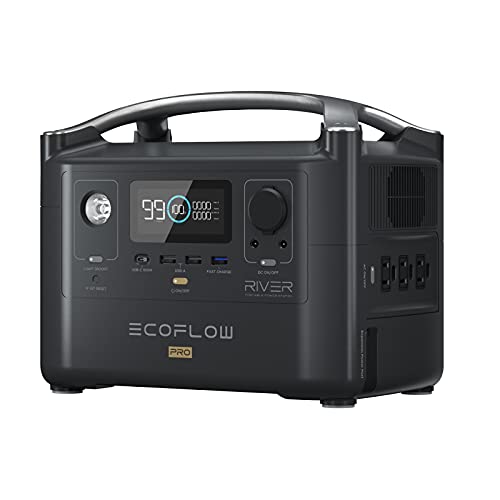
Portable power stations have become almost a necessity for those looking to keep their batteries juiced up during outdoor adventures, professional work in the field, or just to have a reliable backup power source at home. With EcoFlow’s range of power solutions, choosing the right one can be a daunting task. That’s where we come in with a holistic comparison between two of EcoFlow’s heavy hitters – the Delta Pro and the River Pro. Let’s get charged up and dive deep into the details!
Understanding the Specs: Delta Pro vs. River Pro
| Feature | EcoFlow Delta Pro | EcoFlow River Pro |
|---|---|---|
| Capacity (Wh) | 3600 | 720 (expandable to 1440 with extra battery) |
| Weight (lbs/kg) | Approx. 99/45 | 16.8/7.6 |
| Dimensions (in/cm) | 25*11.2*16.4 / 63.5*28.4*42 | 11.4 x 7.1 x 9.3 / 28.9 x 18.0 x 23.5 |
| AC Output (W) | 3600W total | 600W (rated) |
| Surge Capacity (W) | 7200 | 1200 |
| USB Ports | 4 USB-A, 2 USB-C | 3 USB-A, 1 USB-C |
| Cycle Life | 6,500 cycles to 50% capacity | 800+ cycles to 80%+ capacity |
| Charging Methods | AC, Solar, Car, EV Station | AC, Solar, Car |
| Charge Time | 2.7 hours to full AC charge | 1 hour 36 minutes to full AC charge |
| Battery Chemistry | LFP (Lithium Iron Phosphate) | Lithium-ion |
| Expandability | Up to 25kWh with extra batteries | Double capacity with an extra battery |
| Smart Features | WiFi, Bluetooth connectivity | Remote control via mobile app |
| Intended Use | Heavy-duty backup, outdoor recreation, professional production | Outdoor activities, remote work, emergency power |
From the table above, we can see at a glance that the Delta Pro is aimed at those in need of a more robust power solution with its hefty battery capacity and AC output. Meanwhile, the River Pro is the lighter, more portable option perfect for on-the-go charging and less demanding power needs.
Deep Dive into the Delta Pro
The Powerhouse
The EcoFlow Delta Pro asserts its dominance by offering a colossal 3600Wh of battery capacity. But what really stands out is its scalability – the ability to hook up additional batteries to ramp up the power to a gargantuan 25kWh. Need to power heavy-duty tools or provide a home backup for extended outages? The Delta Pro won’t break a sweat with its X-Boost technology pushing the AC output to manage devices with up to 4500W of power draw.
Smart Ecosystem
It’s not just about raw power; it’s also about smart energy management. The Delta Pro can be a cornerstone for a smart energy ecosystem at home. With connectivity options like Wi-Fi and Bluetooth, monitoring and controlling the unit remotely is a breeze. The potential tax credit eligibility under renewable energy incentives adds another layer of appeal for the eco-conscious consumer.

River Pro: Lightweight and Versatile
The Agile Companion
The River Pro may have a smaller initial capacity of 720Wh, but with the option to add an extra battery, you can boost that to a very respectable 1440Wh. It’s a featherweight in comparison to the Delta Pro, making it apt for those who need power on the move. With the X-Boost technology, even this portable unit can handle larger appliances momentarily, supporting up to 1800W.
Charging Speed
EcoFlow’s X-Stream Fast Charging technology is a game-changer for the River Pro, offering a rapid charge up from 0 to 80% in just an hour. This ensures you’re quickly ready to face whatever the day throws at you, without long waits to top up the battery.

Tailored for Different Needs
Between the EcoFlow Delta Pro and the River Pro, potential customers should consider how they intend to use their portable station. For those requiring a powerhouse capable of supporting heavy equipment or providing an emergency home backup, the Delta Pro is the clear choice. Conversely, if portability and speedy charging take precedence, the River Pro stands out as the go-to choice.
Conclusion
In conclusion, both the EcoFlow Delta Pro and River Pro have their unique selling points. The Delta Pro is the ultra-capacity, expandable solution for energy-intensive scenarios, while the River Pro provides a balance of portability, fast charging, and ample power for the average user. Your final decision will boil down to personal requirements, budget, and how you plan to integrate the power station into your life.
